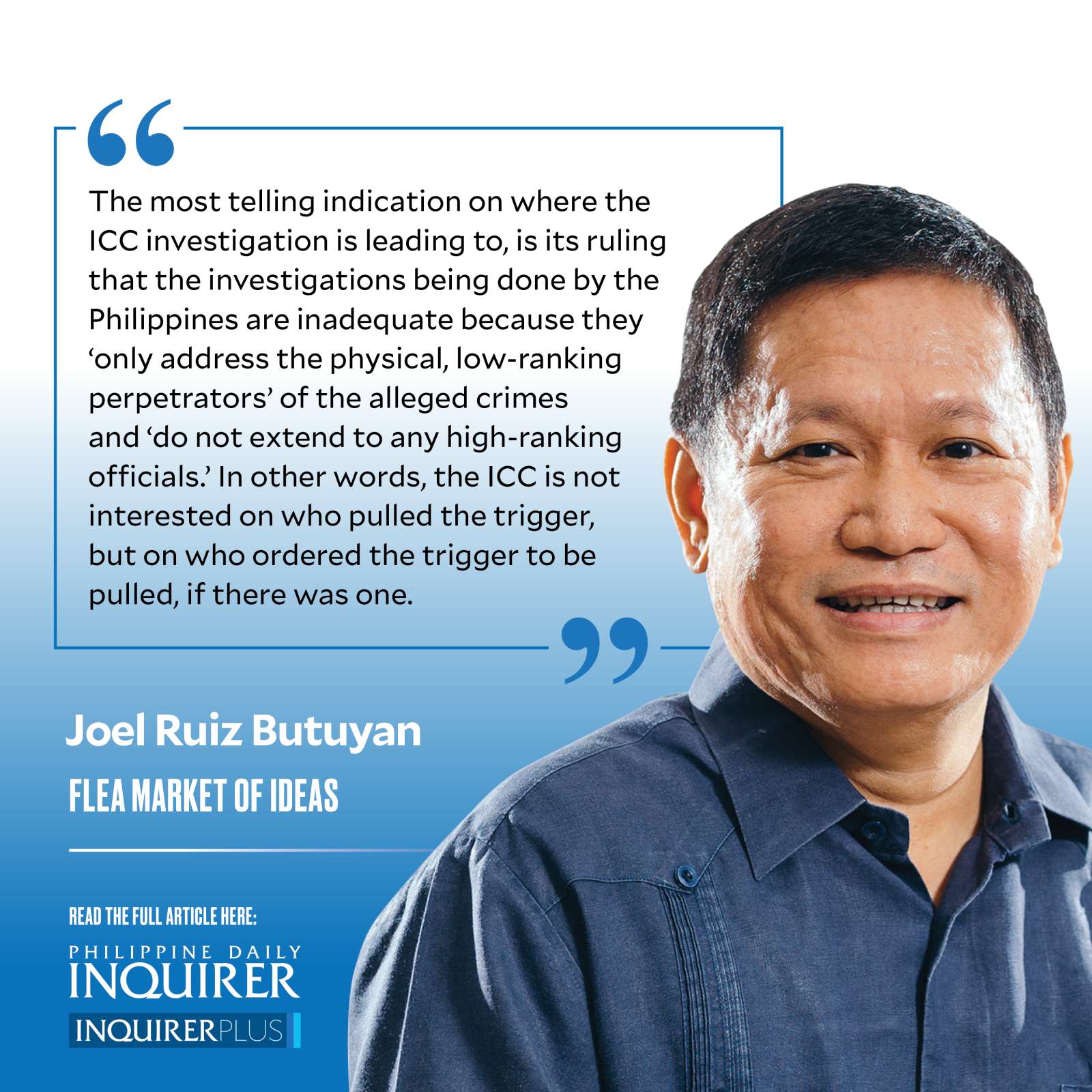A country on trial
The one on trial in the most recent International Criminal Court (ICC) decision was not a person, but a country—the Philippines. Our country was virtually on trial because the question that was decided upon by the ICC was whether the Philippines was conducting “proactive” investigation on whether the multiple crimes that took place in Davao City, Davao region, and in the entire Philippines, from 2011 to 2019, principally as part of the “war on drugs,” were part of a “widespread and systematic attack on a civilian population” that was made pursuant to a state policy. The verdict was that the Philippines was not conducting the proper investigation, prompting the ICC to step in to do the investigation itself.
The most telling indication on where the ICC investigation is leading to, is its ruling that the investigations being done by the Philippines are inadequate because they “only address the physical, low-ranking perpetrators” of the alleged crimes and “do not extend to any high-ranking officials.” In other words, the ICC is not interested on who pulled the trigger, but on who ordered the trigger to be pulled, if there was one.
The ICC ruled that the Philippines “has failed to inquire into any pattern of criminality or the systematic nature of crimes, or investigated individuals who would appear to be most responsible.” If an analogy is to be made, the ICC is not so much interested on individual music players, but on whether or not the multiple musicians were playing as part of a symphony orchestra and who acted as orchestra conductor.
The Philippines tried to reason its way out by arguing that the cases representing the low-level perpetrators are “vital leads that may link higher-ranking officials as part of the chain of command in the commission of the crimes,” and additional cases “may hereafter be investigated or prosecuted in relation to alleged crimes against humanity committed throughout the Philippines.” The ICC was unconvinced, however. The international court ruled that “it is evident that, at present, no investigations or prosecutions covering patterns of criminality or the responsibility of individuals beyond the physical perpetrators of the alleged crimes are taking place.”
What the ICC is essentially saying is, why wait for the triggermen to squeal on the mastermind(s)? There are already enough “supporting material” that should prompt the Philippines to investigate whether or not there was orchestration in the commission of the multiple crimes. In its earlier Sept. 15, 2021 decision authorizing the investigation on the Philippines, the international court cited these supporting material as follows: First, the killing of alleged drug suspects and other criminals were frequently encouraged by Rodrigo Duterte while he was Davao City mayor, presidential candidate, and as Philippine president; second, there is a clear link between the killings and the government’s formal antidrug campaign because there was a marked increase in killings of drug suspects following President Duterte’s assumption of office and the issuance of the “Operation Tokhang” police circular, and there was also reduction in the number of killings following two instances of the suspension of the drug war campaign in 2017; third, the existence of “drug lists” of persons alleged to be involved with illegal drugs; fourth, physical perpetrators were given cash payments, promotions, or awards for killings in the drug war campaign; and, fifth, the Philippines has failed to take meaningful steps to investigate or prosecute the killings.
The evidence provided by the Philippine government that it is investigating the crimes were found wanting by the ICC. They were either ruled as mere lists of cases without any supporting documents, sheer “media articles” unsupported by material with “higher probative value,” or “sparse or disparate” investigations relative to the estimated 12,000 to 30,000 victims connected to the war on drugs. The ICC declared that “Philippines’ authorities have access to official documents” with “detailed information.” Our government’s failure/refusal to provide them were obviously considered as unsupportive of claimed efforts that genuine investigations are being conducted domestically.
The ICC has yet to identify the “high-ranking officials” who will become the specific subjects of its investigation. It has, however, already ruled that the Philippines has failed in its duty to look for these superior officials who may have masterminded the thousands of crimes committed in the drug war.
——————
Comments to fleamarketofideas@gmail.com





















